|
|
|
Sort Order |
|
|
|
Items / Page
|
|
|
|
|
|
|
| Srl | Item |
| 1 |
ID:
168889


|
|
|
|
|
| Summary/Abstract |
What strategies does the United States pursue when it no longer perceives overt military intervention as politically viable or desirable but the problems or issues for which it was formerly undertaken remain? This analysis identifies three such periods in American foreign policy since the United States became a World Power and draws from the work of Peter Hall to develop a typology of strategies according to the magnitude of policy change. These range from adjustment in the settings of interventionism – persistence; the substitution of alternative instruments of foreign policy – ameliorism; and the principled rejection of interventionism in conjunction with a more systematic critique of prevailing foreign policy assumptions – transformationalism. Yet each approach is beset by certain structural limits and contradictions arising from the domestic politics and constitutional-institutional system of the United States that are important in understandiing and appreciating more fully the challenges – and opportunities – of the period ‘after interventionism’.
|
|
|
|
|
|
|
|
|
|
|
|
|
|
|
|
| 2 |
ID:
005526
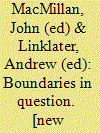

|
|
|
|
|
| Publication |
London, Pinter Pub., 1995.
|
| Description |
xv, 271p.
|
| Standard Number |
1855672650
|
|
|
|
|
|
|
|
|
|
|
|
Copies: C:2/I:0,R:0,Q:0
Circulation
| Accession# | Call# | Current Location | Status | Policy | Location |
| 036618 | 327/MAC 036618 | Main | On Shelf | General | |
| 036877 | 327/MAC 036877 | Main | On Shelf | General | |
|
|
|
|
| 3 |
ID:
124132
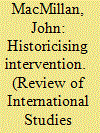

|
|
|
|
|
| Publication |
2013.
|
| Summary/Abstract |
This article identifies three key themes in British intervention for purposes of liberal reordering in the period 1815-50, namely the 'opening-up' of new market spaces (discussed in relation to Uruguay/the Argentine Confederation in the 1840s), a cosmopolitan humanitarianism evident in the campaign for the abolition of the Atlantic slave trade that ran throughout this period, and the political-ideological contest between constitutionalist and absolutist forces and represented here by intervention in the Iberian Peninsula in the late 1820s to1830s. In developing a strategic perspective upon military/naval intervention the analysis shows its utility to have been subordinate to more fundamental sociopolitical, cultural, and institutional determinants. With regard to understanding the outcomes of specific intervention the analysis shows the importance of systematically evaluating developments in the domestic political environments of both intervening and target state as well as the military campaign itself and the need for sufficient general alignment or synchronisation in the timeline of developments in each of these three domains. This model helps to explain that whilst liberal interventions are not necessarily bound to fail, they frequently prove more difficult, complex, and protracted than the interveners expect.
|
|
|
|
|
|
|
|
|
|
|
|
|
|
|
|
| 4 |
ID:
124129
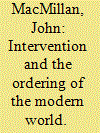

|
|
|
|
|
| Publication |
2013.
|
| Summary/Abstract |
This introductory discussion establishes the notion of intervention as a 'social practice' and carves out the contextual and conceptual space for the Special Issue as a whole. The first move is to recontextualise intervention in terms of 'modernity' as distinct from the sovereign states system. This shift enables a better appreciation of the dynamic and evolutionary context that generates variation in the practice of intervention over time and space and which is analytically sensitive to the economic and cultural (as well as Great Power) hierarchies that generate rationales for intervention. The second move is to reconceptualise intervention as a specific modality of coercion relatively well-suited to the regulation or mediation of conflict between territorially bounded political communities and transnational social forces. Third is to 'historicise' the practice of intervention through showing how it has changed in relation to a range of international orders that have defined the modern world and which are each characterised by a different notion of the relationship between social and territorial space. Fourth and finally is a brief consideration of the possibility of intervention's demise as a social practice.
|
|
|
|
|
|
|
|
|
|
|
|
|
|
|
|
| 5 |
ID:
058916
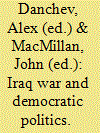

|
|
|
|
|
| Publication |
London, Routledge, 2005.
|
| Description |
viii, 272p.
|
| Standard Number |
0415351472
|
|
|
|
|
|
|
|
|
|
|
|
Copies: C:1/I:0,R:0,Q:0
Circulation
| Accession# | Call# | Current Location | Status | Policy | Location |
| 049182 | 327.73009/DAN 049182 | Main | On Shelf | General | |
|
|
|
|
| 6 |
ID:
051731


|
|
|
|
|
| Publication |
April 2004.
|
| Summary/Abstract |
Recent trends in Democratic Peace theory have called into question the orthodox 'separate democratic peace' position that liberal states are peace-prone only in relations with other liberal states. This article seeks to recast the bases and scope (or parameters) of the relationship between liberalism - primarily left-liberalism - in domestic politics and peace-proneness in foreign affairs, to the effect that whilst this is manifest more broadly than conventionally understood, it is far from universal or undifferentiated. Whilst liberal 'norms' - as indicators of the legitimacy of force - are an important factor in determining when liberals will and will not support the use of force, liberals are also shown to have a higher threshold for the use of force than other groups on the mainstream domestic political spectrum (usually to the Right), indicating greater unwillingness to use force. The cases examined are reasonably neutral, not cherry-picked, in that they are drawn from the three major conflicts of the twentieth century and, as a starting point for the examination of liberal imperialism, Gladstone's Second Ministry (1880-1885). Whilst the above findings are presented as highly significant for understanding the character of liberal peace-proneness and an advance on the separate democratic peace position, the argument is necessarily qualified in an effort to reflect the political complexities of the phenomenon and the limitations of liberal norms as an explanatory factor. It is, however, these very qualifications that put the politics back into the research agenda and connect the knowledge claims to a wider body of academic scrutiny which, ultimately, should lead to a fuller understanding of the relationship between liberalism, democracy and peace. Footnotes 1 Part of this article was written whilst the author was a Research Fellow at the Norwegian Nobel Institute, Oslo. The author would like to thank participants in a research seminar at the Institute and also John Horton, Dan Keohane, and, especially, Bruce Russett for comments on an earlier version of this article. The usual caveat applies.
|
|
|
|
|
|
|
|
|
|
|
|
|
|
|
|
| 7 |
ID:
048529
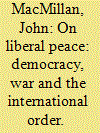

|
|
|
|
|
| Publication |
London, Tauris Academic Studies, 1998.
|
| Description |
ix, 306p.
|
| Standard Number |
1860640109
|
|
|
|
|
|
|
|
|
|
|
|
Copies: C:1/I:0,R:0,Q:0
Circulation
| Accession# | Call# | Current Location | Status | Policy | Location |
| 040064 | 320.51/MAC 040064 | Main | On Shelf | General | |
|
|
|
|
|
|
|
|
|